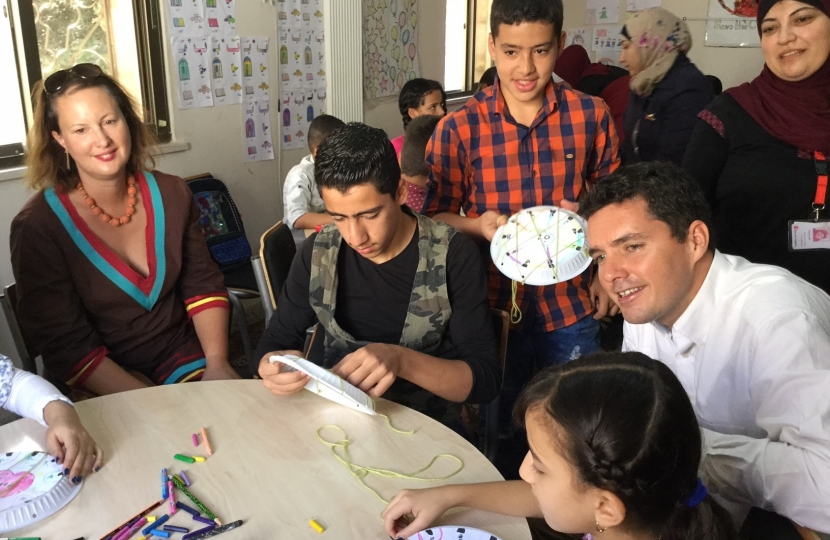
Today we have been visiting education projects which are run by Save the Children, and funded by Pearson, in Amman. Whilst many Syrian refugees are living in Jordanian refugee camps, 80% of the 655,000 officially registered Syrian refugees are living in Jordanian communities and the bulk of these are in Amman.
Education is hugely valued by Syrian parents but getting their children in to schools in Jordan is a challenge and is sadly out of reach for many. Projects run by Save the Children, and sponsored by UK Government Aid and private donors such as Pearson, help to provide education for those who cannot access a school. Official figures record that an estimated 50,000 Syrian refugee children are out of school, with 25,000 having been out of school for 3 years or more. Unofficial figures suggest an even greater number.
The Jordanian authorities have recently committed to delivering 50,000 formal and 20,000 informal school places for Syrian children. The 50,000 new places will be delivered by additional school shifts around the existing Jordanian pupils. This will cause teachers to work longer days. The UK Government have committed over £80m to provide education resources to help deliver this plan. The programme's immediate focus is getting children a place in school. There is also a need to improve community coherence and eradicate violence which has flared up between Jordanian and Syrian pupils as their school days overlap. Organisations are pushing for better integration to allow Jordanian and Syrian pupils to co-exist in a single-shift school day.
At our first education space, Hayy Nazzal Child and Family Centre, we met some pupils who have a place at school (but were off school due to the elections) as well as pupils who were not able to access a school at all. We spoke to the mothers of these children who explained to us why a school place was out of reach. For some, their nearest school was refusing to take Syrian children on the basis that they do not have the necessary visa papers. The Jordanian Ministry of Education has stated that school places should no longer be contingent on registration, visas and paperwork but we heard plenty of examples where the schools were failing to implement this relaxation. With a total absence of school transport, we heard examples of parents being unwilling to send their children on public transport. The second shift schooling tends to be later in the day, when daylight has gone. Understandably, these parents did not want their 6 year old daughters to be travelling across Amman on a public bus. The fear of violence between Jordanians and Syrian children crossing shifts was another reason.
At our second education space, Al Ashrafiyyeh Child and Family Centre, we were given another reason why children could not access school. In Jordan, a child cannot attend school if they have been absent for school for 3 years or more. Given the difficulties in accessing schools, this is a sad reality for many. Thanks to Save the Children, and Pearson, the children we met, ranging from 5 to 16 years old, were receiving literature and numeracy classes and, in time, should be in a position to demonstrate that they are ready for school. The remarkable, but ultimately sad, feature is that these children want to learn, are exceptionally well behaved and engaging and full of determination and optimism but cannot access formal education. It is heartbreaking to see them denied a place in school which many of us in the UK regard as a given.
We are looking forward to visiting Britain's Jordanian Ambassadorial and Department for International Development later today to press the point that the changes in policy, and Government aid, which is designed to deliver school places for Syrian refugees is not yet reaching all places on the ground.
It was a privilege to meet some remarkable children who, despite what they must have been through, and continue to go through, demonstrated talent, determination and potential. It is vital that the authorities work to unleash it.
Huw Merriman MP
Victoria Prentis MP


